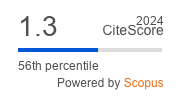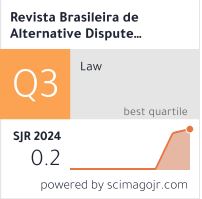Digital Tools to Facilitate the Implementation of Mediation in Criminal Proceedings
Palabras clave:
Digital Technologies, Mediation, Reconciliation of the Parties, Criminal Proceedings, Mediator, Model of Termination of a Criminal CaseResumen
The article is devoted to the issues of digitalization of criminal proceedings in general and conciliation procedures of restorative justice in particular. Mediation, as a form of resolving a criminal conflict, is used in many countries of the world and does not lose its relevance, being an alternative form of resolving a criminal conflict in cases of minor and moderate severity, aimed at restoring social balance by reconciling the accused and the victim, restoring his violated rights. In the context of the digital transformation of criminal proceedings and the expansion of the use of electronic and digital tools, mediation in criminal proceedings can take new forms that contribute to increasing the level of citizens’ access to justice, their interactive interaction and improving the efficiency of legal proceedings in general. The conducted research of the international experience of digitalization of interaction between the state and citizens in criminal proceedings shows not only the variety of electronic resources used in criminal proceedings, but also allows us to predict new architectures of criminal proceedings in small and medium-gravity criminal cases that meet the spirit of modern times. The authors have developed a model of the pre-trial procedure for the termination of a criminal case, which provides for the possibility of implementing a conciliation procedure using digital tools, allowing to terminate a criminal case for a minor crime using a universal multifunctional portal in which each of the subjects of the criminal process interactively implements their procedural rights and obligations, and the final decision is made by the court.
Citas
ASHWORTH, A. The criminal process. An evaluative study. Oxford: Clarendon Press (1994), p. 34-35.
CAI, W., & GODWIN, A. CHALLENGES AND OPPORTUNITIES FOR THE CHINA INTERNATIONAL COMMERCIAL COURT (2019). International & Comparative Law Quarterly, 68 (4), 869-902. doi:10.1017/S0020589319000332
DRAGILEV, E.V., DRAGILEVA, L.L., DROVALEVA, L.S., PALAMARCHUK, S.A. Informatization of the judicial system of China (2022). Legal science. Nº 8. pp.54-59.
DANSHIN, A.V. Ma Siu Method as a Principle of the Socialist Judicial System with Chinese Specifics: history and Modern Understanding (2023). Lex Russica. Nº 9 (202). p. 133-145. DOI: 10.17803/1729-5920.2023.202.9.133-145
FAGET, J. The Double Life of Victim-Offender Mediation in France. https://arbitrationlaw.com/library/double-life-victim-offender-mediation-france-wamr-2005-vol-16-no-7
FERREIRA, D.B., GIOVANNINI, C., GROMOVA, E., da Rocha Schmidt G. Arbitration chambers and trust to technology provider: Impacts of trust technology intermediated dispute resolution proceedings. Technology in Society. (2022), vol. 68, 101872. https://doi.org/10.1016/j.techsoc.2022.101872
FERREIRA, D.B., GROMOVA, E.A., FARIAS, B.O. de, GIOVANNINI, C.J. Online Sports Betting in Brazil and conflict solution clauses. Revista Brasileira de Alternative Dispute Resolution – RBADR, Belo Horizonte, ano 04, n. 07, p. 75-87, jan./jun. 2022. DOI: 10.52028/rbadr.v4i7.5.
GOLOVKO, L.V. New grounds for exemption from criminal liability and problems of their procedural application (1997). State and Law. Nº 8. p. 79-82.
HOWARD, Z., The Little Book of Restorative Justice (2002), 76 p.
KONOPII, A. S. Digital transformation of the state and the rights of China. North Caucasus Legal Vestnik.2021;(3), p. 72-77. DOI: 10.22394/2074-7306-2021-1-3-72-77A.
KONSTANTINOV, P.D. The influence of Information technologies on the principles of civil procedure (comparative legal research on the example of Russia and France): abstract of the dissertation of the Candidate of Legal Sciences. (2022). Ekaterinburg, p. 130.
LUZHINA, A.N. Digital Justice Reform: France and Russia (2022). Social sciences and humanities. Domestic and foreign literature. Nº 3. p. 110-119. DOI: 10.31249/rgpravo/2022. 03.10 MASLENNIKOVA, L.N., SUCHINA, T.E. Experience of Criminal Proceedings Digitalization in the Federal Republic of Germany and Possibilities of its Use in the Criminal Proceedings Digitalization in Russia (2020). Actual Problems of Russian Law, 15(6):214-224. doi. org/10.17803/1994-1471.2020.115.6.214-224
MASLENNIKOVA, L.N. Transformation of Pre-trial Proceedings in the Initial Stage of Criminal Proceedings, Ensuring Access to Justice in the Industry 4.0 Era (2019). Actual Problems of Russian Law. (6):137-146. doi.org/10.17803/1994-1471.2019.103.6.137-146
NEPEYVODA, N. Justice at your fingertips: China’s experience https://zakon.ru/blog/2020/5/2/pravosudie_na_konchikah_palcev_opyt_knr_83633
OLIVEIRA, H.M. de; DIAS, P.C. Audiências de conciliação e mediação por videoconferência no Estado de São Paulo: benefícios e desvan- tagens segundo relatos empíricos dos conciliadores e mediadores judiciais (2022). Revista Brasileira de Alternative Dispute Resolution – RBADR, Belo Horizonte, ano 04, n. 08, p. 146-186, jul./dez. doi: 10.52028/rbadr.v4i8.8.
PILIPENKO, A.N. France: Towards Digital Democracy (2019). Right. Journal of the Higher School of Economics. No. 4. pp. 185-207. DOI: 10.17323/2072-8166.2019.4.185.207
RAKHOVSKY, A.F. The use of artificial intelligence in China’s criminal process (2021) Technologies of the XXI century in jurisprudence: Materials of the Third International Scientific and Practical Conference, Yekaterinburg, May 21. p.69-77. EDN PRJOFX.
RUSAKOVA, E.P. The impact of digitalization on civil proceedings in Russia and abroad: the experience of China, India, Singapore, the European Union, the USA, South Africa and some other countries: dissertation of the Doctor of Law (2021). Moscow, 375p.
RUSMAN, G. The active position of the court is the basis for the successful application of alternative measures in criminal proceedings. Revista Brasileira de Alternative Dispute Resolution – RBADR, Belo Horizonte, ano 04, n. 07, p. 89-101, jan./jun. 2022. DOI: 10.52028/rbadr.v4i7.6.
SHEREMETEV, I.I. Using digital technologies in criminal cases in court: reality and prospects. (2019). Lex Russica. p. 117-131. doi.org/10.17803/1729-5920.2019.150.5.117-131
SUMIN, A.A., KHIMICHEVA, O.V. Artificial Intelligence in the Criminal Procedure of the States of the Asia-pacific Region: A General Overview (2020) International Criminal Law and International Justice, No. 2. pp.18-21. EDN RGILWR.
TARTUCE, F., BRANDãO, D. Mediação e conciliação on-line, vulnerabilidade cibernética e destaques do ato normativo no 1/2020 do Nupemec/SP. Cadernos Jurídicos, São Paulo, ano 21, n. 55, p. 153-162, jul./set. 2020.
TSENEVA, V.V. Exemption from criminal liability in connection with reconciliation with the victim: abstract of the dissertation of the Candidate of Legal Sciences (2002). Tomsk. 24 p.
VASILENKO, A.S., FILIPPOV, V.M., SIMONOVA, M.A., KOVALENKO, S.A. Probabilistic Model of Implementing Mediation into Russia’s Criminal Procedure in the Conditions of Society’s Digital
Transformation (2020). In: Popkova, E., Sergi, B. (eds) Scientific and Technical Revolution: Yesterday, Today and Tomorrow. ISC 2019. Lecture Notes in Networks and Systems, vol. 129. Springer, Cham. doi.org/10.1007/978-3-030-47945-9_140
VINITSKY, L.V., RUSMAN, A.A., RUSMAN, G.S. Termination of the criminal case in connection with the reconciliation of the parties at the stage of preliminary investigation. (2011). Moscow. 149 p.
WANG, M., LIU, G. G., ZHAO, H., BUTT, T., YANG, M., & CUI, Y. The role of mediation in solving medical disputes in China. (2020). BMC health services research, 20(1), 1-10. doi.org/10.1186/ s12913-020-5044-7
YAN Zhang, YIWEI Xia. Can Restorative Justice Reduce Incarceration? A Story From China. (2021). Justice Quarterly, 38:7, p. 1471-1491, doi:10.1080/07418825.2021.1950814
Descargas
Publicado
Número
Sección
Licencia

Esta obra está bajo una licencia internacional Creative Commons Atribución 4.0.
No royalties or other compensation shall be due for the publication of the works.
The opinions expressed by the authors of the articles and reviews are their sole responsibility.









